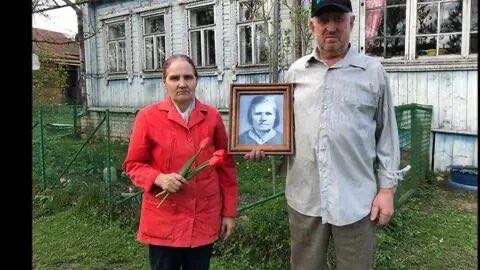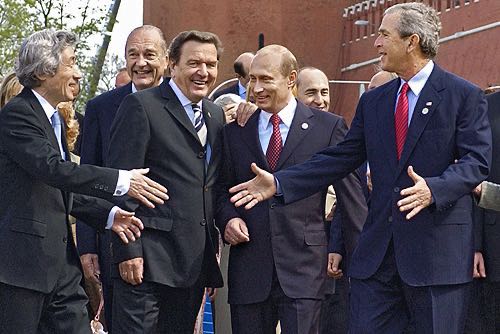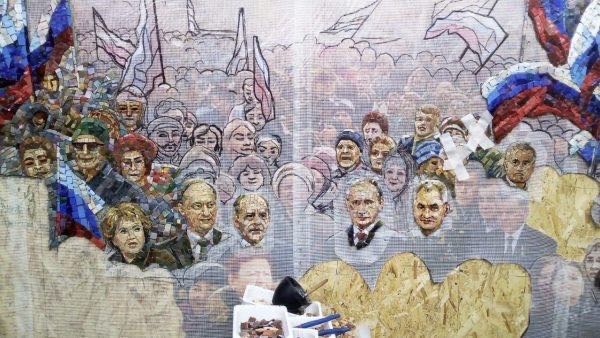Victory Day in Russia, 75 years after the defeat of Nazi-Germany, was a weird celebration, observes historian Ivan Kurilla.The pandemic cancelled the military parade and a jubilee summit of world leaders, put in question the constitutional reform that would give Vladimir Putin the right to stay in power for life, and postponed the memory war between Russia and her neighbors.
 Families remember their relatives who fought or perished in World War II. Photo vk.ru
Families remember their relatives who fought or perished in World War II. Photo vk.ru
by Ivan Kurilla
For the current Russian regime, the memory of the WWII is the foundational myth and legitimating story. 27 million Soviet casualties in the war means that every Russian family had somebody who fought or perished in that catastrophe, so the war trauma is the social glue keeping the society together. Memory of the Great Patriotic War (as Russians call the events of 1941-1945, after Hitler attacked the USSR) is still alive and plays an important role in any contemporary debate.
While the Kremlin actively used the memory of war in its history politics, a new mass movement emerged to claim ‘ownership’ of that memory by families. Since 2012, more and more people participated in processions of the ‘immortal regiment’ on May 9, demonstrating photographs of their grandfathers who served and died in the World War. In 2019, more than five million people participated in immortal regiments in Russia and worldwide, making it the largest popular initiative in the recent Russian history. The Kremlin attempted to steal the movement by creating a parallel organizing structure under administrative control, called ‘Immortal Regiment of Russia’. Participants do not distinguish between the two, so administrative control increased along with the gradual slide from the idea of family memory to a less personal ‘memory of all heroes’. For an independent observer, it was difficult to judge the level of loyalism expressed by the participants, and many intellectuals choose to think about all immortal regiments as merely a ‘Soviet style ritual’.
It was not, and May 9, 2020 suddenly demonstrated that there are two different types of commemoration. One, represented by state officials, including many governors, and demonstrated on TV screens,tried to replace popular processions with re-enacted carnival with portraits of war generals and Stalin himself on display. The other, extremely powerful in the social networks, based commemoration on personal stories about family members. This juxtaposition of the state, depersonalized memory and popular family memory of war was never so clear when two ‘immortal regiments’ walked in the same processions.
Putin’s anniversary
All the previous year the Kremlin was busy in preparation for the jubilee Victory Day in 2020, attempting to orchestrate it as a triumph of Putin’s 20 years in power. Moreover, in February 2020, Putin suggested to amend the Russian Constitution to lift the two-term limit on presidency, thus letting him stay in the Kremlin for life. The final procedure of a quasi-referendum (it was named ‘all-Russian poll’) was scheduled for April 22, so by the time of Victory Day Russia would have a new political reality. The pandemic forced the government to postpone the referendum, thus sending Russian politics into limbo (all the other procedures to amend the Constitution were finished in March). It also crushed the hope for international approval (at least partial) of this change by world leaders who would arrive in Moscow for V-day.
Memory War
The international dimension of the Victory Day celebration was vital. The USSR’s role as a key victor in the war is one of the major foreign policy assets for the Kremlin: it gave the USSR a permanent place in the UN Security Council (inherited by Russia), and it also makes it possible to invite foreign leaders to Moscow for the May 9 celebrations. This became especially important in recent years given the international sanctions against Russia imposed since the 2014 annexation of Crimea and subsequent interference in Ukraine and accusations of meddling in the US elections.
From his very first weeks in the Kremlin back in 2000, Putin presented himself a defender of the sacred memory of the Russian casualties. This memory was threatened by ‘falsifiers of history’ abroad. For Russians, it is important to know that the Soviet Union was on the right side in the battle against the absolute evil of Nazism - this narrative vindicates unimaginable human sacrifice. The sacrifice, in the eyes of many Russians, also vindicated Soviet policy in 1939-1940 (the annexation of the Baltic states) and after the war, when parts of Europe were forced to establish Communist regimes under Soviet control.
Other Russians don’t justify these policies, but also believe that this should not change the assessment of the Soviet role in the fight against Nazism. While some Eastern European countries, led by contemporary Polish nationalist government, promoted re-evaluation of the war as a clash of ‘two totalitarianisms’, the Russian narrative was still shared in its fundamentals by Germany, Israel, and, with some reservations, by the major Western allies of the WWII. Indeed, on April 25, 2020, Donald Trump and Vladimir Putin issued a joint statement commemorating the 75th Anniversary of the Meeting on the Elbe, - the culmination of the war-time alliance efforts to defeat Nazi Germany.
 Victory Day in Moscow in 2005, a different world
Victory Day in Moscow in 2005, a different world
However, the world context has significantly changed since the previous jubilees. 25 years ago, Moscow V-Day parade on the 50th anniversary of the war end was attended by all former allied Western leaders, by the leaders of the defeated Germany, Italy and Japan, the Chinese president and other other heads of states and international organizations. In 2005, the 60th anniversary parade brought to Moscow George Bush, the Japanese prime minister Koizumi, the French president Chirac, and the German chancellor Gerhard Schroeder.
The list of the leaders who confirmed their participation in the Moscow commemoration by March 2020 listed the French president Macron as the only leader of a major Western country, the Chinese leader Xi Jinping and Indian prime minister Narendra Modi. Donald Trump expressed publicly his hesitations and his desire to come, but the pandemic rescued him from making the decision.
European attitudes are now less sympathetic to the Russian version of history. In September 2019, the European Parliament voted for the resolution ‘on the importance of European remembrance for the future of Europe’ which ‘stresses that the Second World War, the most devastating war in Europe’s history, was started as an immediate result of the notorious Nazi-Soviet Treaty on Non-Aggression of 23 August 1939, also known as the Molotov-Ribbentrop Pact, and its secret protocols, whereby two totalitarian regimes that shared the goal of world conquest divided Europe into two zones of influence’. The wording of this document was considered in Russia as unjust and even offensive.
In December 2019 Putin on several occasions lectured people (including presidents of the members of the Eurasian economic union, former Soviet republics) about the ‘real history’ of the WWII beginning, talked about shared responsibility of all European states for the outbreak of the war and made caustic observations about Polish statesmen of that epoch. He even promised to write an article about those years by the Victory Day. The Polish response was very emotional with a new wave of equaling the USSR and Nazi Germany that, in turn, gave Russian propaganda the opportunity to underline th need to defend ‘our history’.
However, the pandemic suddenly stopped this memory war. All governments faced immediate challenges that pushed disputes about past to the background. Putin did not publish his article about year 1939. The Second World War did not become the main news even on the day of the 75th anniversary of its European end. In an article published on May 7 the German Foreign Minister Heiko Maas and historian Andreas Wirsching insist that ‘Germany alone is responsible’ for the start of the WWII and for the crimes against humanity of the Holocaust. The article looked like an public support of Russian criticism of the European Parliament’s resolution.
The new set of references which now reframing world politics may be temporary. But it may as well persist and define a different agenda in the coming years.
What’s next?
So far, all the planned celebrations are not cancelled but postponed. Observers guess whether the Victory parade will be moved to June 24 (the day of the parade in 1945) or to September 3 (for some mysterious reason the State Duma moved the Russian commemoration of the end of WWII from September 2 to September 3). Another riddle is the new date of the constitutional ‘poll’. If the logic will remain the same it was planned for this April and May, the poll must precede the parade with large international participation, and the celebration should help to legitimize the constitutional change.
 The unfinished mosaic which triggered a scandal and was removed
The unfinished mosaic which triggered a scandal and was removed
Meanwhile, the Ministry of Defense has almost completed a ‘main Orthodox Cathedral of the Army’. Publication of pictures of the church interior caused a scandal: people discovered a mosaic with faces of Vladimir Putin, the current Minister of Defense Sergey Shoigu, and other top Russian politicians, along with a portrait of Joseph Stalin. The scandal forced the designers to remove the mosaic, however, the whole construction seems to be timed for the celebration. The construction of the regime was almost over, - and then enter: the coronavirus.
